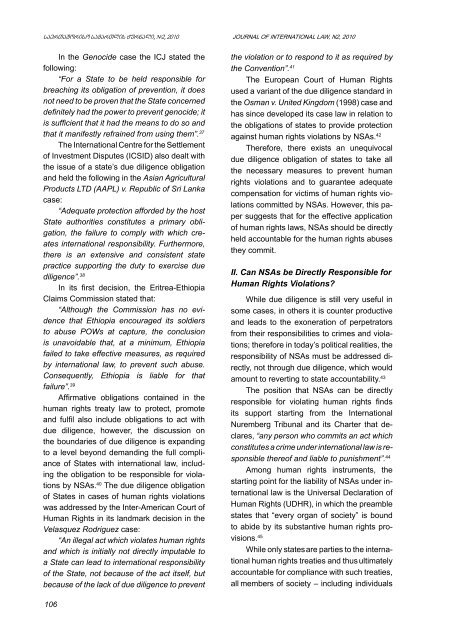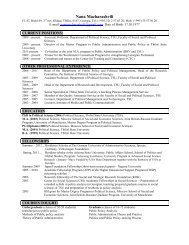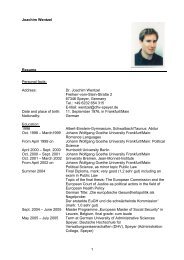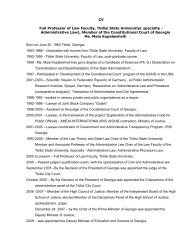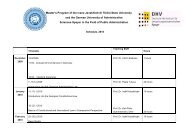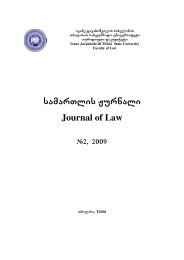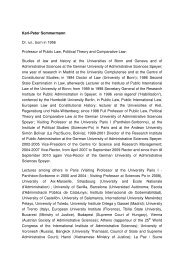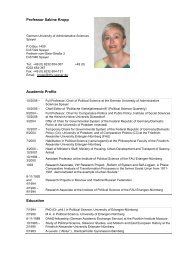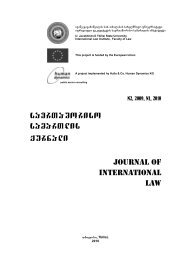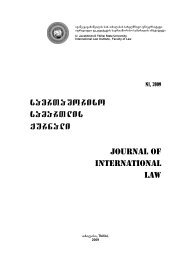Journal International Law_N2-10.indd
Journal International Law_N2-10.indd
Journal International Law_N2-10.indd
You also want an ePaper? Increase the reach of your titles
YUMPU automatically turns print PDFs into web optimized ePapers that Google loves.
saerTaSoriso samarTlis Jurnali, #2, 2010 JOURNAL OF INTERNATIONAL LAW, <strong>N2</strong>, 2010In the Genocide case the ICJ stated thefollowing:“For a State to be held responsible forbreaching its obligation of prevention, it doesnot need to be proven that the State concerneddefi nitely had the power to prevent genocide; itis suffi cient that it had the means to do so andthat it manifestly refrained from using them”. 37The <strong>International</strong> Centre for the Settlementof Investment Disputes (ICSID) also dealt withthe issue of a state’s due diligence obligationand held the following in the Asian AgriculturalProducts LTD (AAPL) v. Republic of Sri Lankacase:“Adequate protection afforded by the hostState authorities constitutes a primary obligation,the failure to comply with which createsinternational responsibility. Furthermore,there is an extensive and consistent statepractice supporting the duty to exercise duediligence”. 38In its fi rst decision, the Eritrea-EthiopiaClaims Commission stated that:“Although the Commission has no evidencethat Ethiopia encouraged its soldiersto abuse POWs at capture, the conclusionis unavoidable that, at a minimum, Ethiopiafailed to take effective measures, as requiredby international law, to prevent such abuse.Consequently, Ethiopia is liable for thatfailure”. 39Affi rmative obligations contained in thehuman rights treaty law to protect, promoteand fulfi l also include obligations to act withdue diligence, however, the discussion onthe boundaries of due diligence is expandingto a level beyond demanding the full complianceof States with international law, includingthe obligation to be responsible for violationsby NSAs. 40 The due diligence obligationof States in cases of human rights violationswas addressed by the Inter-American Court ofHuman Rights in its landmark decision in theVelasquez Rodriguez case:“An illegal act which violates human rightsand which is initially not directly imputable toa State can lead to international responsibilityof the State, not because of the act itself, butbecause of the lack of due diligence to preventthe violation or to respond to it as required bythe Convention”. 41The European Court of Human Rightsused a variant of the due diligence standard inthe Osman v. United Kingdom (1998) case andhas since developed its case law in relation tothe obligations of states to provide protectionagainst human rights violations by NSAs. 42Therefore, there exists an unequivocaldue diligence obligation of states to take allthe necessary measures to prevent humanrights violations and to guarantee adequatecompensation for victims of human rights violationscommitted by NSAs. However, this papersuggests that for the effective applicationof human rights laws, NSAs should be directlyheld accountable for the human rights abusesthey commit.II. Can NSAs be Directly Responsible forHuman Rights Violations?While due diligence is still very useful insome cases, in others it is counter productiveand leads to the exoneration of perpetratorsfrom their responsibilities to crimes and violations;therefore in today’s political realities, theresponsibility of NSAs must be addressed directly,not through due diligence, which wouldamount to reverting to state accountability. 43The position that NSAs can be directlyresponsible for violating human rights fi ndsits support starting from the <strong>International</strong>Nuremberg Tribunal and its Charter that declares,“any person who commits an act whichconstitutes a crime under international law is responsiblethereof and liable to punishment”. 44Among human rights instruments, thestarting point for the liability of NSAs under internationallaw is the Universal Declaration ofHuman Rights (UDHR), in which the preamblestates that “every organ of society” is boundto abide by its substantive human rights provisions.45While only states are parties to the internationalhuman rights treaties and thus ultimatelyaccountable for compliance with such treaties,all members of society – including individuals106


